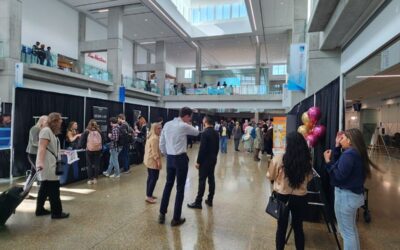Join the movement to reduce NAIT’s environmental footprint
One of the major issues today is concern for the environment. NAIT already has many initiatives in place to reduce NAIT’s environmental footprint, but is there room for improvement? That’s what four students in the Bachelor of Technology Management Program examined for their capstone project.
Ali Raza, Ron Dunn, Lance Draper and Shelly Stevens, collectively known as Team N8 (pronounced [N-eight]) performed a high-level environmental assessment to identify opportunities to reduce NAIT’s environmental footprint.
The team’s research found a number of environmental initiatives that students can see already. Recycling/waste stations are set up around campus with easy directions to identify what goes where, plus NAIT also offers battery and cell phone recycling boxes.
Behind the scenes, NAIT’s Facilities Management has undertaken several energy and environmental initiatives that include light conversions from T12 to T8/LED’s, occupancy sensors to turn lights off when rooms are empty and a green cleaning program that uses environmentally friendly cleaning products.
A current plan from NAIT’s Procurement Department is to reduce print material. They have asked all their suppliers to discontinue the practice of mailing paper catalogues to NAIT. Purchasers prefer online catalogues as they offer an easy to use search function and accessibility. The Procurement Department even asked suppliers to send electronic Christmas cards instead of paper ones.
NAIT’s Culinary Department participates with the Oceanwise Sustainable Seafood Program to offer viable seafood choices in their outlets. Culinary already reduces NAIT’s environmental footprint by sending unusable items (bones, fat, trim) to a processing plant which turns them into animal feed. They also donate to the Edmonton Food Bank, and are partners with NAIT’s Food Services purchasing imperfect vegetables from local suppliers.
NAIT’s Board of Governors made a formal commitment to the environment when they approved NAIT’s Sustainability Policy in 2008.
“The Board of Governors is committed to developing and maintaining an environment that enhances human health and fosters a transition toward environmental sustainability,” states the policy.
Six years ago, NAIT began participating in the Sustainability Tracking, Assessment & Rating System (STARS), a self-reporting system for colleges and universities that measures sustainability performance. NAIT received silver in their most recent STARS rating in 2015 receiving a rating of 1.8 out of a possible 5.0 points for waste minimization. This beats their bronze in 2012. They hope to achieve gold by 2021.
Team N8 focused on NAIT’s 2015 STARS report, which is available online, to see where NAIT could reach higher. NAIT reported 811.33 tons of solid waste materials sent to landfills/incinerations, 663.82 tons of composted materials and 505.03 tons of recycled materials. NAIT was recycling and composting a significant portion of its waste at the time. In 2018 these numbers will change drastically, in a negative way.
The City of Edmonton, where NAIT sends its waste, has had some major setbacks with their waste management program. Edmonton’s waste composter stopped working in the fall of 2017 because of structural issues with the roof; its future is unclear at this time. The option of turning Edmonton’s waste into biofuels is hopeful, but with no timeline.
China’s waste import ban also came in effect in 2018, so they will not be accepting the world’s garbage anymore. Edmonton has been sending 10,000 tons of recyclables per year to China, roughly 25% of the city’s recyclables. The City is currently exploring options to manage Edmonton’s waste and an action plan will be presented to the Utility Commission this week.
Where does this leave NAIT staff and students? With a huge opportunity to make a difference to our campus and our city. NAIT has always been a leader in our community, and the timing is right to make a bold move to change people’s behaviours regarding waste reduction.
The NAIT Challenge – You can help NAIT change the world!
If someone walked up to you today and told you that you could change the world by doing one simple thing, would you do it? What if it was as easy as using a reusable coffee cup? If students brought their reusable coffee cups instead of relying on disposable, it would have a profound impact on NAIT’s environmental footprint.
Disposable coffee cups are not recyclable, despite what you might read on the websites of some of our favorite coffee shops. Take a look at the City of Edmonton’s and NAIT’s recycling posters – both exclude coffee cups. Coffee cups are made of a combination of paper and a plastic/wax type material that allows them to contain liquid, but recycling the cups is tricky since their combination of materials produces low-grade paper, and there’s no market for it.
The City of Edmonton Waste Management confirmed in January that disposable coffee cups are presently going to the landfill. Team N8’s research regarding disposable coffee cups led them to a growing global movement.
In 2016, the French government committed to banning disposable coffee cups by 2020. Britain issued a parliamentary report in January proposing a hefty tax on every disposable coffee cup sold, coined the “latte levy”. These solutions are percolating in Canada as well. Vancouver is considering a legislative ban on disposable coffee cups.
Team N8 made an unexpected discovery during their research. NAIT’s 2008 Corporate Social Responsibility (CSR) pamphlet listed “Elimination of disposable coffee cups through a gradual shift to widespread use of personal, reusable mugs” as one of its goals. That was ten years ago. Eliminating the disposable coffee cup from NAIT campuses is just one of the recommendations that Team N8 is proposing to reduce NAIT’s environmental footprint. But don’t wait for the final report to participate in this initiative. You can change the world today by bringing your reusable coffee cup to NAIT!
– Shelly Stevens





